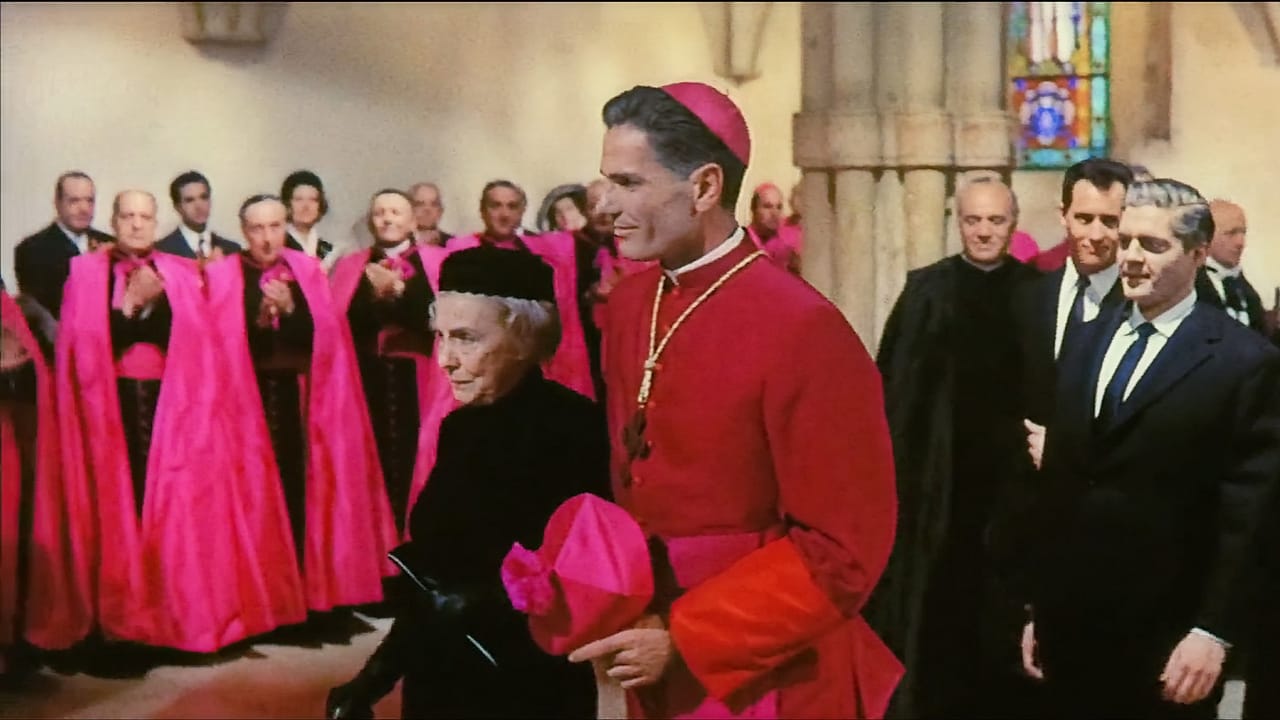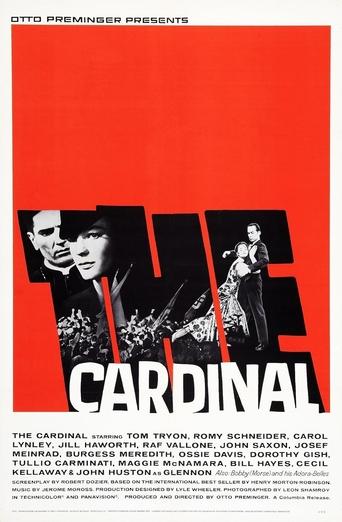

Terrible acting, screenplay and direction.
... View MoreOne of the worst ways to make a cult movie is to set out to make a cult movie.
... View MoreAmazing worth wacthing. So good. Biased but well made with many good points.
... View MoreA clunky actioner with a handful of cool moments.
... View MoreAt the Vatican in 1917 Rome, stately American Tom Tryon (as Stephen "Steve" Fermoyle) is ordained a Catholic priest. After discussing the possibility of achieving even loftier positions, Mr. Tryon returns home to practice in Boston, Massachusetts. The first problem at home involves Tyron's free-spitted sister Carol Lynley (as Mona), who is dating a Jewish man. Her boyfriend John Saxon (as Benny Rampell) considers converting to Catholicism. Suddenly, everything changes. Possibly deemed too big for his britches, Tyron is transferred to another parish, by a superior John Huston (as Glennon)...In her last appearance, veteran "silent" actress Dorothy Gish has a featured role as Tyron's mother...Tyron meets ailing Burgess Meredith (as Ned Halley) and new parishioners. He deals with Mr. Meredith's multiple sclerosis and Ms. Lynley's marital infidelity. In a musical interlude, Robert Morse dances with sexy women. Lynley dances the tango. Abortion enters the story. Years pass. Tyron questions his vocation. In Vienna, Tyron is tempted by pretty Romy Schneider (as Annemarie). Lynley reappears in another role. Years pass. Tyron fights the Ku Klux Klan and Nazis. A new World War looms. "The Cardinal" produced (very well) and directed by Otto Preminger. Unfortunately, the movie is a bore.***** The Cardinal (12/12/63) Otto Preminger ~ Tom Tryon, Romy Schneider, Carol Lynley, John Huston
... View MorePerhaps its my age,or maybe the current times,but I hadn't seen this film since its release in 1963 that runs 175 minutes,and what a shame that has been.To be a catholic,what does that mean?I've felt there are many roads to Heaven,but the road you take,stay on it or you surly will get lost.Growing up as a catholic I was always angry that some picked and choose what to believe.be one or not,it's not like going to supermarket and buying only what you like. Eventually I too left the church.Will this re watching make me go back,only God knows.Otto Preminger put together a film based on a novel by Henry Morton Robinson thats challenging,hard and sometimes painful to watch,but in the end,its true to what being a catholic is all about in the modern world.you might even say it foresaw "liberation theology"but in a different way. Today we have a Pope who is from Argentina,we had one from Germany and Poland since this film was made.Very interesting indeed.Now to the picture itself. Tom Tryon ,in by far his greatest performance plays Stephen Fermoyle,who at the films end does become a Cardinal.We open with him before the ceremony and his reflecting back over the years as he left his education at the Vatican with his teacher played by Ral Vallone,now we know why HE played a Pope in Godfather 3,and the steps he took as a irish catholic priest from boston to the Vatican and the many conflicting tests to his faith that he conquered while winning some,and losing other battles along the way.First he's knocked down a bit by a Bishop who sees some of himself in the priest and wants the young priest to be saved from ambition and false pride,played by John Houston,so he sends him to a broken down local parish run by a good humble priest,played by Burgess Meredith,where he proves himself to be unselfish. Then family,sister,played by Carol Lynley, in failed relation with a Jew and then a vaudevillian dancer and final death during child birth. A midlife crisis of life in in the 1920's where on leave as he he's questioning his calling,he falls in love but not with a woman who loves him,Romy Schneider,but back to his own calling. Then conscience,civil race strife in Georgia in the 1930's with Ossie Davis as a young black priest. Finally,the movie began at the dawn of WW1 and it comes full circle to the clouds of WW11 gathering on the Horizon. There are many other fine actors as well,Its a sweeping film that doesn't dodge tough questions but rather lets you focus on what YOU think of your own responsibilities in this life as seen thru the eyes of a man of the cloth who questions and seeks as we do.
... View MoreI quite like Otto Preminger's work, which has consisted of some masterpieces(Laura), some great movies(Carmen Jones), some underrated curiosities(Under Your Spell) to decent and interesting(this). So far, my least has been River of No Return, and even that was nowhere near close to awful.I found The Cardinal to be interesting and a very decent little movie. It isn't entirely successful however, the film is lengthy and does feel overlong and stodgy in places, Tom Tryon's lead performance is rather stiff and when I saw The Cardinal, the sound seemed muffled.However it is a well made movie, with beautiful locations and photography, and the music score is highly emotional. Preminger directs with his usual efficiency, the script has many moments of thoughtfulness and the story is crafted in a loving and careful manner and asks several questions which is a further point of interest. To make up for Tryon, we do have a great supporting cast, especially Burgess Meredith and John Huston who are both wonderful. And the scene with Meredith dying and Huston visiting him was beautifully done.In conclusion, an interesting film. 7/10 Bethany Cox
... View MoreFirst off, I have to point out that I have never read the novel from which this film was based, so I can't really say much about how the two compare. Second, I am not Catholic and I assume Catholics might feel a bit differently about this film. As for me, I was fascinated by having this glimpse into a very atypical sort of priest--but one that was easy to like and admire.Handsome Tom Tryon stars as the title character. When the film begins, he's reminiscing about his life--from his early days in the priesthood to the present (in pre-WWII Italy) as he's about to be elevated to Cardinal--the second highest office in the church. As for his life, despite his elevated position, he's far from a perfect man--he's made some mistakes, had some doubts and had a rather ecumenical view of religion that probably ruffled a few feathers. The path from start to finish is very long and slowly unveils--but at about three hours the film did NOT seem plodding or overly long.About the only thing I disliked about the film is that you might get the impression that the Church was much stronger in its condemnation of Fascism--something some did but many, many more did not. Still, well-written, acted and directed--this one is worth seeing.
... View More